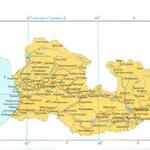In American foreign policy much attention is paid to the territories of the post-Soviet space. There are many reasons for this. First and foremost, among the broad sections of the population of the former union republics, there is a growing awareness of the processes that have taken place over the past 30 years. Namely: under the guise of the struggle for independence, on the contrary, occurred the loss of the sovereignty of the former socialist states, once united in a single union.
Therefore, the main task of the United States is to prevent the growth of Russia's international authority and the expansion of its influence in the post-Soviet space. In the former socialist republics, those media that focus on the United States and the West as a whole compete with each other in inciting hatred for everything Russian, wanting to turn former friends into sworn enemies. Technologies of such processes have long been worked out by Western public relations specialists.
At the same time, the US is solving other tasks, in particular, in the use of minerals, geography, human and energy resources for its own purposes.
The once spoilt and generously endowed Soviet republic, and now the irreconcilable enemy of the whole Russian - Georgia, is not an exception.
Although the republic does not have significant reserves of oil and gas, it occupies a strategic position in Transcaucasia. For Washington, Georgia is a "gateway" from the Black Sea to the Caspian region and further to Central Asia.
Through the controlled rulers putting the Georgian people on the brink of survival, the USA through the various foundations and NGOs finances only such projects that in one way or another promote their interests by influencing on the minds of people in various fields - science, culture, art, the media, etc. This ensures the silence of the bulk of the population, the diversion of its attention to the image of the enemy, created in the face of neighboring nations and historical friends.
In addition, the US finances the army, conducts exercises, supports the necessary NGOs, organizes "Museums of occupation" and others ... Georgian government propaganda presents this as gratuitous assistance, but the US is not inclined to the actions of providing gratuitous assistance to anyone. While dollars flow to the development of the "young Transcaucasian democracy", the clock of history already measures the countdown. There will come a day when Georgia will have to pay for the tranches.
But so far, American emissaries and politicians come to Georgia, as to their patrimony, to monitor the fulfillment of these instructions earlier and to make adjustments to the behavior of Georgian politicians.
In mid-October, another conference on defense and security was held in Batumi. A whole landing of American advisers landed at the event: the former US ambassador to Ukraine D. Herbst, the US Department of Defense and State Department employee M. Carpenter, the expert on Russia, the CIS and the Caucasus W. Lahue, the US commander in Afghanistan, General D. Nicholson, "Diplomat" D. Wilson, research associate of a large number of universities, and concurrently a specialist in color revolutions L. Mitchell. Naturally, the event was not held without the true "head of Georgia" - US Ambassador J. Kelly.
Much attention was paid to the issue of the "Georgian territories occupied by Russia" (this is how the South Ossetia and Abkhazia are now called in the western newscast), as well as to the fears of the West in the conditions of increasing the influence of the Russian Federation.
Georgian speakers emphasized the special importance of support from Western partners, without which in such a complicated region, it is allegedly impossible to ensure peace and security. Although the population of Georgia remembers well that all the troubles of the inhabitants of the Caucasus region began precisely after the collapse of the Soviet Union and the growing influence of the United States and Europe in the South Caucasus through activists of nationalist organizations, representatives of the emigration of the Caucasian countries financed by them, and then directly through their henchmen in the ruling elites.
Americans, of course, supported the Georgian politicians and promised to help on all issues, repeating the words about the "territorial integrity" as a mantra.
Georgia, declaring its entry into NATO as the main direction of its policy, wishes to fulfill this task as soon as possible. At the same time, all this is organized by such an information and propaganda campaign, as if it is about realizing the dream of the Georgian people themselves, not about further infringement of Georgia's sovereignty and the upcoming absorption of the remnants of its independence by the West.
However, the population of Georgia should pay attention to the Eastern Europe and see that joining NATO has not improved the welfare of those countries that joined the Alliance earlier than Georgia, just hoping to improve their financial situation. The US, as usual, will promise much, but will only fulfill its tasks, which do not coincide with the interests of the Georgian population.
Inal Pliev, an expert of the IA "Res"






